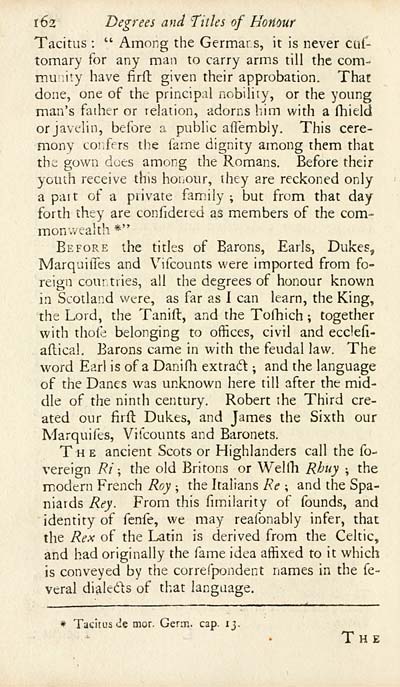Blair Collection > Critical dissertations on the origin, antiquities, language, government, manners, and religion, of the antient Caledonians, their posterity the Picts, and the British and Irish Scots
(200)
Download files
Complete book:
Individual page:
Thumbnail gallery: Grid view | List view

l6z Degrees and Titles of Honour
Tacitus : " Among the Germar.s, it is never cui-
tomary for any man to carry arms till the com-
mu'jty have firft given their approbation. That
done, one of the principal nobility, or the young
man's father or relation, adorns him with a fhield
or javelin, before a public aflembly. This cere-
mony confers the fame dignity among them that
the gown does among the Romans. Before their
youth receive this honour, ihey are reckoned only
a pait of a private fam.ily ; but from that day
forth they are confidered as members of the com-
monvvealth *"
Before the titles of Barons, Earls, Dukes,
Marquiffes and Vifcounts were imported from fo-
reign countries, all the degrees of honour known
in Scotland were, as far as I can learn, the King,
the Lord, the Tanift, and the Tofhich ; together
with thofi belonging to offices, civil and ecclefi-
aftical. Barons came in with the feudal law. The
word Earl is of a Danifh extrad ; and the language
of the Danes was unknown here till after the mid-
dle of the ninth century. Robert the Third cre-
ated our firft Dukes, and James the Sixth our
Marquifes, Vifcounts and Baronets.
The ancient Scots or Highlanders call the fo-
vereign Ri ; the old Britons or Wellli Rhuy ; the
modern French Roy -, the Italians Re ; and the Spa-
niards Rey. From this fimilarity of founds, and
identity of fcnfe, we may reafonably infer, that
the Rex of the Latin is derived from the Celtic,
and had originally the fame idea affixed to it which
is conveyed by the correfpondent names in the fe-
veral dialedls of that language.
* Tacitus lie mor. Germ. cap. 13.
The
Tacitus : " Among the Germar.s, it is never cui-
tomary for any man to carry arms till the com-
mu'jty have firft given their approbation. That
done, one of the principal nobility, or the young
man's father or relation, adorns him with a fhield
or javelin, before a public aflembly. This cere-
mony confers the fame dignity among them that
the gown does among the Romans. Before their
youth receive this honour, ihey are reckoned only
a pait of a private fam.ily ; but from that day
forth they are confidered as members of the com-
monvvealth *"
Before the titles of Barons, Earls, Dukes,
Marquiffes and Vifcounts were imported from fo-
reign countries, all the degrees of honour known
in Scotland were, as far as I can learn, the King,
the Lord, the Tanift, and the Tofhich ; together
with thofi belonging to offices, civil and ecclefi-
aftical. Barons came in with the feudal law. The
word Earl is of a Danifh extrad ; and the language
of the Danes was unknown here till after the mid-
dle of the ninth century. Robert the Third cre-
ated our firft Dukes, and James the Sixth our
Marquifes, Vifcounts and Baronets.
The ancient Scots or Highlanders call the fo-
vereign Ri ; the old Britons or Wellli Rhuy ; the
modern French Roy -, the Italians Re ; and the Spa-
niards Rey. From this fimilarity of founds, and
identity of fcnfe, we may reafonably infer, that
the Rex of the Latin is derived from the Celtic,
and had originally the fame idea affixed to it which
is conveyed by the correfpondent names in the fe-
veral dialedls of that language.
* Tacitus lie mor. Germ. cap. 13.
The
Set display mode to: Large image | Transcription
Images and transcriptions on this page, including medium image downloads, may be used under the Creative Commons Attribution 4.0 International Licence unless otherwise stated. ![]()
| Permanent URL | https://digital.nls.uk/76288811 |
|---|
| Description | A selection of books from a collection of more than 500 titles, mostly on religious and literary topics. Also includes some material dealing with other Celtic languages and societies. Collection created towards the end of the 19th century by Lady Evelyn Stewart Murray. |
|---|
| Description | Selected items from five 'Special and Named Printed Collections'. Includes books in Gaelic and other Celtic languages, works about the Gaels, their languages, literature, culture and history. |
|---|

